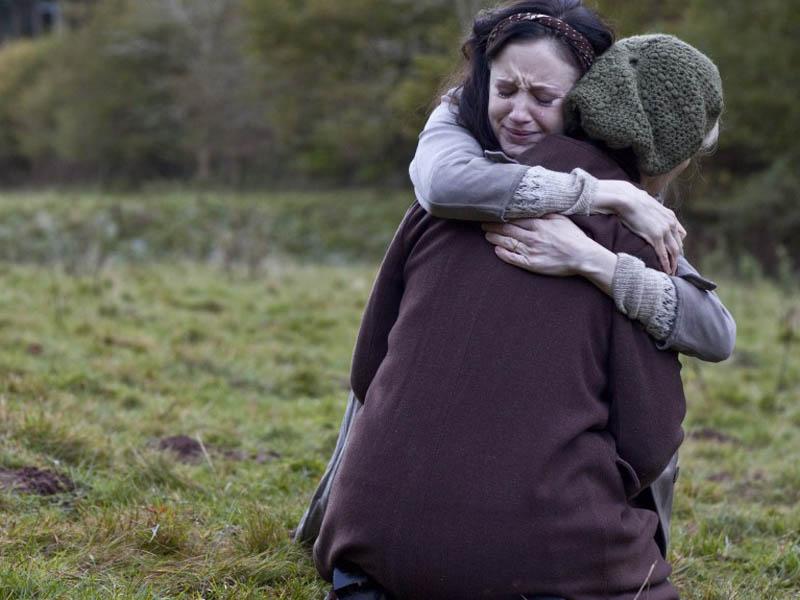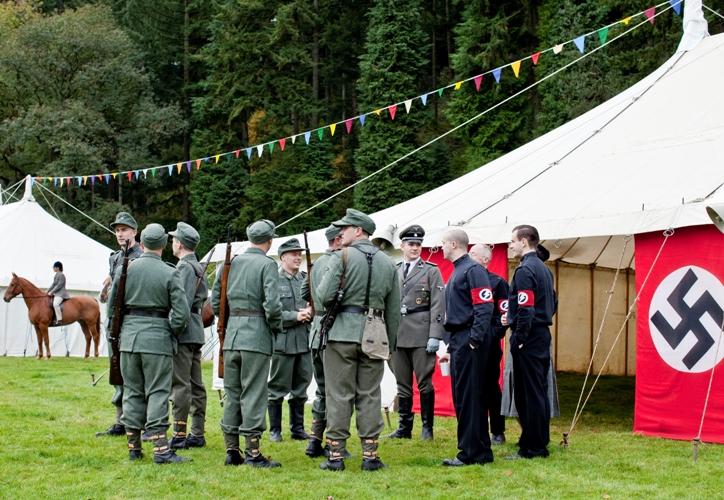Resistance | reviews, news & interviews
Resistance
Resistance
Owen Sheers's what-if novel set in the Black Mountains does not make for cinematic poetry

What if D-Day had failed? Even at a remove of nearly 80 years, it is strangely arresting to hear a BBC radio announcer giving details of how the Nazis have taken over Oxford and Swindon but are being met with resistance in Coventry and Leicester. Amit Gupta’s directorial debut, an adaptation of co-screenwriter Owen Sheers’s own first novel, begins promisingly enough.
 The story follows Sarah Lewis, a farmer’s wife, who wakes one morning to find that not only her husband Tom but most of the men in the small community of hillside farmhouses have simply disappeared. The men have taken up arms as part of an imagined guerilla resistance force. But the real story starts when a small band of German soldiers arrive in the valley. They are depicted very differently to most of cinema’s Nazis. Alternating between German and very lightly accented English, they do not wear red armbands decorated by swastikas that might prejudice us against them. Their commander Wolfram (Tom Wlaschiha), who enters Sarah’s house – and life – with a steely calm, does not want the Gestapo in the area. He wants the war to pass quietly.
The story follows Sarah Lewis, a farmer’s wife, who wakes one morning to find that not only her husband Tom but most of the men in the small community of hillside farmhouses have simply disappeared. The men have taken up arms as part of an imagined guerilla resistance force. But the real story starts when a small band of German soldiers arrive in the valley. They are depicted very differently to most of cinema’s Nazis. Alternating between German and very lightly accented English, they do not wear red armbands decorated by swastikas that might prejudice us against them. Their commander Wolfram (Tom Wlaschiha), who enters Sarah’s house – and life – with a steely calm, does not want the Gestapo in the area. He wants the war to pass quietly.
The film is preoccupied, to its own detriment, with subtlety and silence. Apart from very occasional outbreaks of mournful violin and the frequent whistling of the wind, when people are not talking there is silence. Long, painful silence. We get it: the house is empty without Tom; the village is empty without the men. But even long after we have got it, the quiet continues. It’s hard to do silence well in any medium, but an over-protracted silence will always lose its power. In one scene, Wolfram puts a record on. “You have no music here," he tells Sarah. "I thought you might like some." But the music paces as slowly as the story.
 Andrea Riseborough gives a rather cold performance as Sarah. A lack of characterisation through interaction with others ensuring that we never really share the agony of her difficult choices. We spend a lot of the film watching her stand still. The storms raging inside her barely threaten to surface; that would be too unsubtle. Michael Sheen, fresh from his collaboration with Sheers on The Passion of Port Talbot, the theatre highlight of the past year, is severely underused in his casting as Tommy Atkins, a role which consists mainly of appearing in flashbacks giving advice to a young man before, during and after he does things, so as to explain to the audience why he has done them.
Andrea Riseborough gives a rather cold performance as Sarah. A lack of characterisation through interaction with others ensuring that we never really share the agony of her difficult choices. We spend a lot of the film watching her stand still. The storms raging inside her barely threaten to surface; that would be too unsubtle. Michael Sheen, fresh from his collaboration with Sheers on The Passion of Port Talbot, the theatre highlight of the past year, is severely underused in his casting as Tommy Atkins, a role which consists mainly of appearing in flashbacks giving advice to a young man before, during and after he does things, so as to explain to the audience why he has done them.
Ultimately a story that relies on our watching a woman write letters or men looking at the woman through binoculars is going to fail to hold the attention, let alone arouse compassion for the difficult choices its characters face. The film suffers from a lack of variation in pace, tone, colour and drama. Moments of high emotion are delivered with the quietude of poetry; even the screams are silent. In Sheen’s set-piece speech, Atkins tells us that “the nature of our resistance can’t be decided in words; our choices will be the mark of who we are”. Which is a very interesting thought that doesn’t work on film. The brooding beauty of the landscape aside, there is no compelling reason for this novel’s translation into the visual medium.
- Resistance is released on Friday
Watch the trailer to Resistance
rating
Explore topics
Share this article
The future of Arts Journalism
You can stop theartsdesk.com closing!
We urgently need financing to survive. Our fundraising drive has thus far raised £49,000 but we need to reach £100,000 or we will be forced to close. Please contribute here: https://gofund.me/c3f6033d
And if you can forward this information to anyone who might assist, we’d be grateful.

Subscribe to theartsdesk.com
Thank you for continuing to read our work on theartsdesk.com. For unlimited access to every article in its entirety, including our archive of more than 15,000 pieces, we're asking for £5 per month or £40 per year. We feel it's a very good deal, and hope you do too.
To take a subscription now simply click here.
And if you're looking for that extra gift for a friend or family member, why not treat them to a theartsdesk.com gift subscription?
more Film
 The Perfect Neighbor, Netflix review - Florida found-footage documentary is a harrowing watch
Sundance winner chronicles a death that should have been prevented
The Perfect Neighbor, Netflix review - Florida found-footage documentary is a harrowing watch
Sundance winner chronicles a death that should have been prevented
 Blu-ray: Le Quai des Brumes
Love twinkles in the gloom of Marcel Carné’s fogbound French poetic realist classic
Blu-ray: Le Quai des Brumes
Love twinkles in the gloom of Marcel Carné’s fogbound French poetic realist classic
 Frankenstein review - the Prometheus of the charnel house
Guillermo del Toro is fitfully inspired, but often lost in long-held ambitions
Frankenstein review - the Prometheus of the charnel house
Guillermo del Toro is fitfully inspired, but often lost in long-held ambitions
 London Film Festival 2025 - a Korean masterclass in black comedy and a Camus classic effectively realised
New films from Park Chan-wook, Gianfranco Rosi, François Ozon, Ildikó Enyedi and more
London Film Festival 2025 - a Korean masterclass in black comedy and a Camus classic effectively realised
New films from Park Chan-wook, Gianfranco Rosi, François Ozon, Ildikó Enyedi and more
 After the Hunt review - muddled #MeToo provocation
Julia Roberts excels despite misfiring drama
After the Hunt review - muddled #MeToo provocation
Julia Roberts excels despite misfiring drama
 London Film Festival 2025 - Bradley Cooper channels John Bishop, the Boss goes to Nebraska, and a French pandemic
... not to mention Kristen Stewart's directing debut and a punchy prison drama
London Film Festival 2025 - Bradley Cooper channels John Bishop, the Boss goes to Nebraska, and a French pandemic
... not to mention Kristen Stewart's directing debut and a punchy prison drama
 Ballad of a Small Player review - Colin Farrell's all in as a gambler down on his luck
Conclave director Edward Berger swaps the Vatican for Asia's sin city
Ballad of a Small Player review - Colin Farrell's all in as a gambler down on his luck
Conclave director Edward Berger swaps the Vatican for Asia's sin city
 London Film Festival 2025 - from paranoia in Brazil and Iran, to light relief in New York and Tuscany
'Jay Kelly' disappoints, 'It Was Just an Accident' doesn't
London Film Festival 2025 - from paranoia in Brazil and Iran, to light relief in New York and Tuscany
'Jay Kelly' disappoints, 'It Was Just an Accident' doesn't
 Iron Ladies review - working-class heroines of the Miners' Strike
Documentary salutes the staunch women who fought Thatcher's pit closures
Iron Ladies review - working-class heroines of the Miners' Strike
Documentary salutes the staunch women who fought Thatcher's pit closures
 Blu-ray: The Man in the White Suit
Ealing Studios' prescient black comedy, as sharp as ever
Blu-ray: The Man in the White Suit
Ealing Studios' prescient black comedy, as sharp as ever
 The Woman in Cabin 10 review - Scandi noir meets Agatha Christie on a superyacht
Reason goes overboard on a seagoing mystery thriller
The Woman in Cabin 10 review - Scandi noir meets Agatha Christie on a superyacht
Reason goes overboard on a seagoing mystery thriller
 London Film Festival 2025 - crime, punishment, pop stars and shrinks
Daniel Craig investigates, Jodie Foster speaks French and Colin Farrell has a gambling habit
London Film Festival 2025 - crime, punishment, pop stars and shrinks
Daniel Craig investigates, Jodie Foster speaks French and Colin Farrell has a gambling habit

Add comment